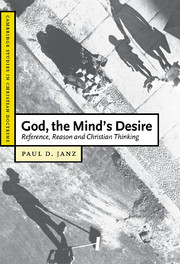Book contents
- Frontmatter
- Contents
- Acknowledgements
- 1 A reconnaissance of theology and epistemology
- 2 Theology and the lure of obscurity
- 3 Philosophy's perpetual polarities: anti-realism and realism
- 4 Philosophy's perpetual polarities: making and finding
- 5 Philosophy's perpetual polarities: act and being
- 6 The Kantian inversion of ‘all previous philosophy’
- 7 Tragedy, empirical history and finality
- 8 Penultimacy and Christology
- Bibliography
- Index
8 - Penultimacy and Christology
Published online by Cambridge University Press: 22 September 2009
- Frontmatter
- Contents
- Acknowledgements
- 1 A reconnaissance of theology and epistemology
- 2 Theology and the lure of obscurity
- 3 Philosophy's perpetual polarities: anti-realism and realism
- 4 Philosophy's perpetual polarities: making and finding
- 5 Philosophy's perpetual polarities: act and being
- 6 The Kantian inversion of ‘all previous philosophy’
- 7 Tragedy, empirical history and finality
- 8 Penultimacy and Christology
- Bibliography
- Index
Summary
This final chapter introduces and explores a different kind of ‘hermeneutic’ – the relationality of ‘penultimate’ and ‘ultimate’ – in order to address the difficulties still remaining with regard to the problem of theological reference, and accordingly to bring my own broader enquiry into Christian thinking to something of a conclusion. The penultimate/ultimate formula as I will develop it here, leading into a particular kind of confrontation between epistemology and Christology, aims to provide an interpretive framework that is broader, more transparent and flexible than either the foregoing explorations in tragedy based on MacKinnon or the hermeneutic of the Eucharist in Marion, both of which are pursued and developed for somewhat similar purposes. The point of similarity is that Marion's desire for ‘the referent in its very advent’ and MacKinnon's insistence, amplified by his focus on tragedy, that the reality of the theological referent must be protected against idealism of any kind, even if this takes the form of an ideal actuality, these two must be understood as expressions of the same fundamental concern, voiced in different ways. This shared concern is, at all costs, to avoid abstraction with regard to the theological referent, since an abstract referent is a guarantee of immanence, a logical exclusion of transcendence, in a way that empirical reality is not. An abstract (non-empirical) referent would thus effectively mark the end of theology by the reduction of it to some form or other of religious phenomenology.
- Type
- Chapter
- Information
- God, the Mind's DesireReference, Reason and Christian Thinking, pp. 191 - 222Publisher: Cambridge University PressPrint publication year: 2004



